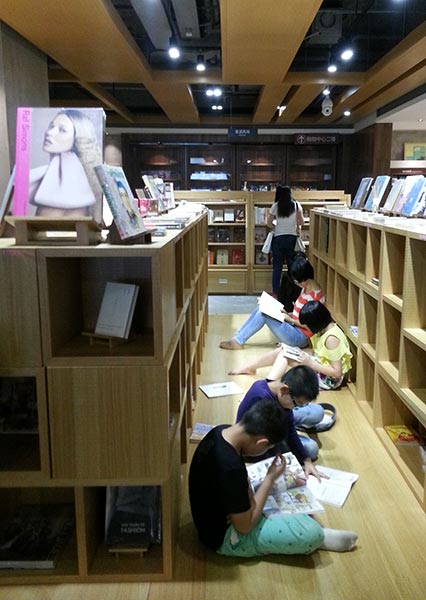Changsha's first 24-hour bookstore adds to trend
By Deng Zhangyu ( China Daily ) Updated: 2015-07-15 08:06:46
 |
|
Taskin, the first 24-hour bookstore in Changsha, Hunan province, founded by Long Guxin, offers visitors more than the fun of reading.[Photo by Deng Zhangyu/China Daily] |
A trend of 24-hour bookstores has emerged in the country since last summer, when Beijing shop Sanlian started to keep its doors open all the time.
While the traditional book business has been hit in many countries owing to the rise of e-reading, such old establishments with new thinking are seemingly growing in China.
There are more than 14 round-the-clock bookstores in a few Chinese cities and more are likely to open this year, according to statistics released by an association of 24-hour bookstores.
A case in point is Taskin, the first 24-hour bookstore in Changsha in Hunan province. The city in Central China is dubbed the "hub of recreation" in China.
"People living in Changsha usually go to karaoke bars, nightclubs and play mahjong after work," says Long Guxin, the 47-year-old founder of Taskin. "But with more young people pouring into the city, they need to read to relax their minds at night after a busy daytime schedule."
Long himself has been reading books at night for years, a habit he picked up while starting his business in Shenzhen in South China's Guangdong province.
In 2006, he used to make nightly visits to Shenzhen Central bookstore that was the first of its kind in China.
About the size of eight basketball fields, Long's 3,200-square-meter bookshop is in the basement of a shopping center. Taskin has a coffee area, separate reading rooms, display area, tea houses and spaces for children to play.
Since 2006, the Taskin Group has invested about 40 million yuan ($6.50 million) in the bookshop. Long visited lots of bookstores at home and abroad. Every time he went to the United States and Canada, he would first visit local bookshops, he says.
But some of the bookstores he visited in Western countries have closed down in the past few years, Long says.
"It's a global trend that traditional bookstores are being forced to shut down by their digital rivals," he says.
|
|
|
|
|
|






















 Raymond Zhou:
Raymond Zhou: Pauline D Loh:
Pauline D Loh: Hot Pot
Hot Pot Eco China
Eco China China Dream
China Dream China Face
China Face






